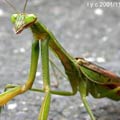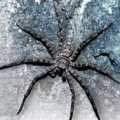 康乃爾大學昆蟲學家羅西(John Losey)說:「下次看到昆蟲,要打死牠、踩死牠、詛咒牠或漠視牠之前,請先三思!」羅西在最新一期《生物科學》(BioScience)期刊中發表一篇研究指出,昆蟲所提供的四大類服務,在美國每年總值超過570億美元(約1.85兆台幣)。
康乃爾大學昆蟲學家羅西(John Losey)說:「下次看到昆蟲,要打死牠、踩死牠、詛咒牠或漠視牠之前,請先三思!」羅西在最新一期《生物科學》(BioScience)期刊中發表一篇研究指出,昆蟲所提供的四大類服務,在美國每年總值超過570億美元(約1.85兆台幣)。
羅西說:「最近科學家才開始瞭解到,大多數昆蟲以某種方式扮演牠們的功能,改善我們的環境和生活,而且毫不間斷。不要讓昆蟲嬌小的身軀愚弄了你,這些令人驚奇的小生命提供的可是相當有價值的服務。」
該研究發現本土昆蟲是野生動植物的食物來源,而這些自然環境提供了500億美元的休閒產業;在害蟲控制方面,昆蟲提供相當於45億美元以上的服務;在協助農作物授粉和清潔牧場方面提供30億美元,節省每年牧場工人3.8億美元的開銷。羅西指出「而這項『保守』估計可能僅僅代表真實價值的一小部分而已。」
羅西的共同作者——康乃爾大學研究生沃漢(Mace Vaughan),目前在奧勒崗州波特蘭市擔任保育社團Xerces Society的節肢動物保育指導員,Xerces社團主要工作為透過教育和研究來保護本土昆蟲的棲地。
昆蟲是複雜生物網絡交互作用中一個不可或缺的部分,協助提供我們餐桌上的食物並且消除我們的廢棄物。如果沒有了昆蟲,人類甚至可能所有地球上的生命都將一一滅絕殆盡。
 身為一名應用昆蟲學家,羅西說:「我們知道如何去修補道路以及各式各樣的硬體建設,但是我們的『生物基礎環境』(biological infrastructure)卻脆弱不堪而走向毀壞之路。假如我們再不關心它們,將有可能面臨崩解並且嚴重衝擊經濟生計。」沃漢指出,「事實上在很多方面已可看出我們的『生物基礎環境』正在崩盤,例如農作物的授粉作用。」
身為一名應用昆蟲學家,羅西說:「我們知道如何去修補道路以及各式各樣的硬體建設,但是我們的『生物基礎環境』(biological infrastructure)卻脆弱不堪而走向毀壞之路。假如我們再不關心它們,將有可能面臨崩解並且嚴重衝擊經濟生計。」沃漢指出,「事實上在很多方面已可看出我們的『生物基礎環境』正在崩盤,例如農作物的授粉作用。」
這兩位科學家是根據已出版的資料,計算出當前情況下昆蟲服務所提供的價值,以及理論上昆蟲服務消失時的價值,並將兩者加以比對分析。這項分析還不包括那些尚未提及的昆蟲功效包括:動物屍體、垃圾和樹木的分解,從而減少森林大火發生的可能性;研究中也還未計算到昆蟲製造蜂蜜,蟲膠,染料和其他產品的功效。
Think twice before you swat, stomp, curse or ignore insects, says Cornell University entomologist John Losey. His research, published in the current issue of the journal "BioScience" shows that the dollar value of just four services provided by insects is worth more than $57 billion in the United States each year.
"Most insects tirelessly perform functions that improve our environment and lives in ways that scientists are only beginning to understand," Losey says. "Don't let the insects' small stature fool you - these minute marvels provide valuable services."
The study found that native insects are food for wildlife that supports a $50 billion recreation industry, provide more than $4.5 billion in pest control, pollinate $3 billion in crops and clean up grazing lands, which saves ranchers some $380 million a year. And these are "very conservative" estimates that probably represent only a fraction of the true value, says Losey, associate professor of entomology at Cornell.
Losey co-authored the study with Mace Vaughan, a Cornell graduate, who now serves as conservation director of the Xerces Society for Invertebrate Conservation in Portland, Oregon. The Xerces Society works to protect native insect habitats through education and research.
Insects are an integral part of a complex web of interactions that helps put food on our tables and remove our wastes. Humans, and probably most life on Earth, would perish without insects, Vaughan said.
"We know how to repair roads and other components of our physical infrastructure, but our biological infrastructure is vulnerable to degradation too," said Losey, an applied insect ecologist. "If we do not take care of it, it will break down and could seriously impact the economy." "In fact in many places - crop pollination, for example - the cracks in the infrastructure are already showing," says Vaughn.
Using published data, the scientists compared the values of each service at current levels of function to theoretical levels if these serves were absent. The analysis did not include such insect services as decomposing carcasses, garbage and trees - thereby decreasing the likelihood of forest fires. Also omitted from the study were the insect functions of producing honey, shellac, dyes and other products.



